- Home
- State Quarters
- 1999 Delaware
1999 Delaware State Quarter Value: How Much Is This US Coin Worth?
The 1999 Delaware state quarter is available in four different varieties and they were minted at Philadelphia, Denver and San Francisco.
They are worth anything from their face value of 25 cents to around $1400 depending on grade and their prices are slowly decreasing as more high quality state quarters are being graded.
Delaware quarters with mint errors or ones of very high quality can sell for considerably more at auction and a record price of $17,250 was achieved on December 4th, 2007 for a Silver Proof PR70DCAM.
This is actually the current most valuable state quarter ever sold.
1999 P Delaware (Regular Strike)
- Designer: John Flanagan/William Cousins
- Mint: Philadelphia (P)
- Metal Composition: 75% Copper - 25% Nickel
- Diameter: 24.3 mm
- Weight: 5.67 grams
- Mintage: 373,400,000
- Value: $0.25 (G4) - $1,472 (MS68)
1999 D Delaware (Regular Strike)
- Designer: John Flanagan/William Cousins
- Mint: Denver (D)
- Metal Composition: 75% Copper - 25% Nickel
- Diameter: 24.3 mm
- Weight: 5.67 grams
- Mintage: 401,424,000
- Value: $0.25 (G4) - $258.50 (MS68)
1999 S Delaware (Proof Strike)
- Designer: John Flanagan/William Cousins
- Mint: San Francisco (S)
- Metal Composition: 75% Copper - 25% Nickel
- Diameter: 24.3 mm
- Weight: 5.67 grams
- Mintage: 3,714,359
- Value: $7.65 (PR65) - $1,322.50 (PR70DCAM)
1999 S Delaware (Silver Proof Strike)
- Designer: John Flanagan/William Cousins
- Mint: San Francisco (S)
- Metal Composition: 90% Silver - 10% Copper
- Diameter: 24.3 mm
- Weight: 6.3 grams
- Mintage: 804,565
- Value: $35 (PR65) - $17,250 (PR70DCAM)
About The 1999 Delaware State Quarter
The Delaware state quarter was released on January 4th, 1999 and was the first coin produced for the upcoming 50 State Quarters program from the United States Mint.
The new coins were produced in the order that each state was admitted to the union and ratified the constitution which in the case of Delaware was December 7th, 1787.
A total of 779,342,924 quarters were minted across three US mints which included Philadelphia, Denver & San Francisco.
There were 373,400,000 regular strike coins minted in Philadelphia and 401,424,000 in Denver.
In San Francisco, 3,714,359 proof strikes and 804,565 silver proof strikes were minted.
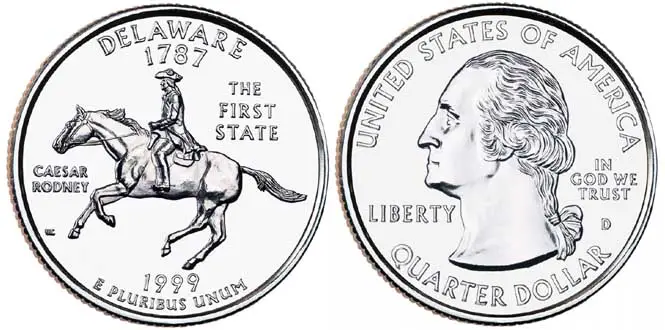
Image Courtesy of United States Mint
On the obverse of the 1999 Delaware state quarter is a bust of George Washington looking to the left. Above his head is written 'UNITED STATES OF AMERICA' and at the bottom of the image is written 'QUARTER DOLLAR'.
On the left side of the obverse is written 'LIBERTY' and on the right 'IN GOD WE TRUST' with the mint mark just below the 'U' of 'TRUST'.
In this case the letter 'D' means it was minted in Denver which makes it a regular strike variety as only San Francisco minted proof and silver proof coins.
On the reverse is a centered image of Caesar Rodney riding a horse.
Caesar Augustus Rodney was a former Governor of Delaware and is depicted riding a horse on this commemorative quarter because that was how he cast his decisive Delaware vote for independence.
In July, 1776, he rode all night covering 80 miles to get to the Independence Hall, Philadelphia, in time to cast his vote in favor of Delaware signing the Declaration of Independence which consequently sent Delaware into the Civil War.
Above this is written 'DELAWARE 1787' which is the year they ratified the United States constitution and above right of the horse is written 'THE FIRST STATE' as they were the first state to do so.
To the left reads 'CAESAR RODNEY' and at the bottom is written the mint date 1999 with 'E PLURIBUS UNUM' below.
1999 Delaware State Quarter Errors
The spitting horse is one of the most common errors found on the Delaware state quarters that were minted in Philadelphia.
It is known as a die crack error. The die prints the coin design onto a blank planchet. As it becomes worn a crack starts to form on the die surface.
This transfers to the coin as a raised line across the surface of the imprinted design.
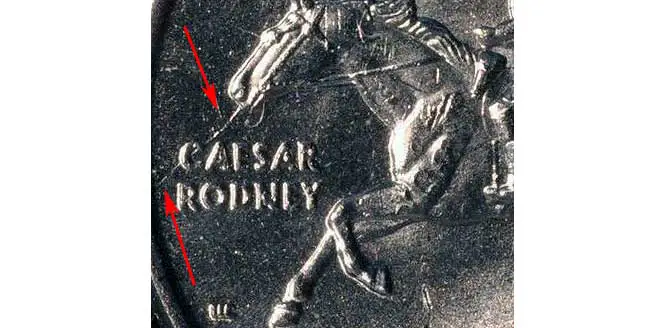
Spitting Horse Die Crack Error
As you can see from the image above, the horse looks like it is spitting. The line goes from the horse's mouth down through the 'C' of Caesar towards the edge of the quarter.
There were probably 1000's of these minted before the operator noticed and changed the die. As they are quite common, they are not worth very much, but still a great find for your coin collection.
You should expect to get anywhere from $5 to $50 depending on the quality of the coin and the length of the die crack.
Check coin forums and auction sites such as eBay to see how much they are being sold for.
Nickel Planchet Error
This planchet error only happened at the Denver mint. A bunch of the new Delaware quarters were struck on Jefferson Nickel planchets made from 75% Copper and 25% Nickel.
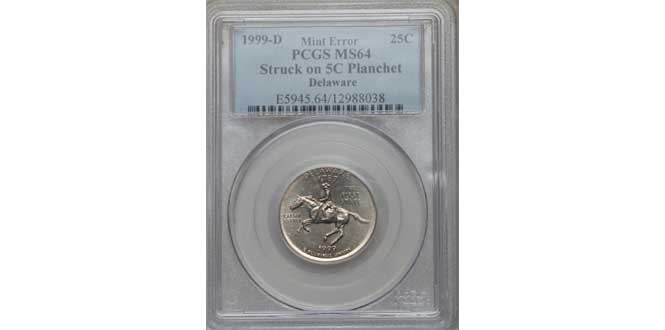
Image Source: Heritage Auctions
A graded coin from PCGS like the one above could fetch around $500 at auction.
Experimental Planchet Error
Another less common error found on Delaware state quarters is known as the experimental planchet error.
This striking error occurred when an experimental planchet produced for the new 2000 Sacagawea dollar was used with the Delaware quarter dies.
It produced a golden colored coin made out of 88.5% Copper, 6% Zinc, 3.5% Manganese and 2% Nickel.
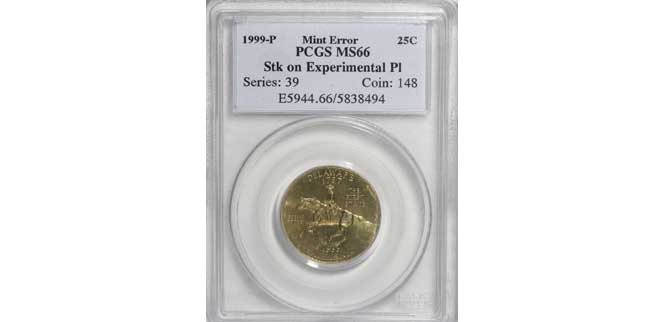
Image Source: Heritage Auctions
This particular error only affected coins minted in Philadelphia. You could expect to get around $3000 at auction for one of these error coins.
Some other errors to look out for on the 1999 Delaware state quarter include: Multiple struck reverse die cap's, Off-center strikes & Rotated dies.
Some Interesting Facts About Delaware State
It's the second smallest state in the United States of America with a land area of just under 2000 square miles and the least populated.
It is known as the home of tax free shopping as there is no sales tax, its capital is Dover, and its biggest city is Wilmington.
The state bird of Delaware is the Blue Hen and Rehoboth Beach was the location of the first 'Miss United States' beauty contest held in 1880 where Thomas Edison was a judge.
1999 State Quarter Collection
Pennsylvania, New Jersey, Georgia & Connecticut
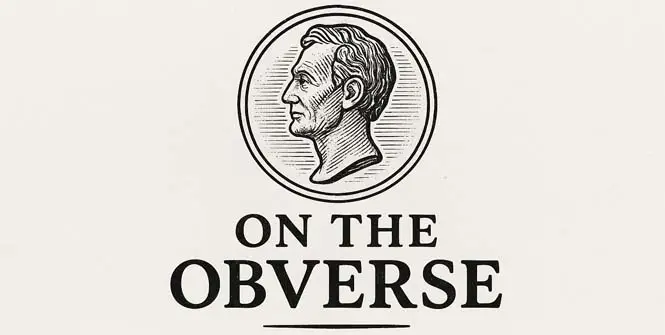
Would You Like To Receive More Exciting News And Information About Coin Collecting Direct To Your Inbox?
Enter your best email address and first name below, check the boxes and click Send It To Me! now to get your FREE copy of On The Obverse newsletter.
